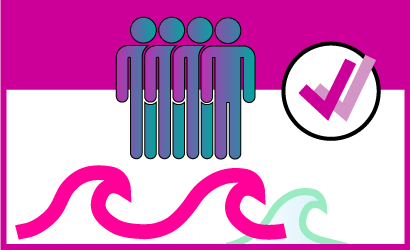

In the context of evidence uptake and sustainability, one outcome of social movements is that change agents may develop the know-how of social movement thinking and actions. In this section, you will learn how the experiences of change agents using social movement actions have increased their capacity in leading change and empowered them to lead other change initiatives, such as health transformations, as informal and formal leaders.
What is the outcome ‘Increased capacity in leading change’?
As a result of engaging in social movement thinking and actions, change agents, change teams and others can be positively impacted in the following ways:
- expect and are expected to lead change and engage in health-care reform as part of their roles. As an outcome of engaging in mobilized individual and collective action, health-care providers reinvent themselves as change agents with the developed know-how to lead change initiatives. Becoming a change agent, in addition to a clinical leader, is assumed and seen as a shared responsibility by all providers within their role and scope (Waring & Crompton, 2017; Wynn et al., 2011).
- have strengthened social ties with their colleagues and workplaces. As a result of partnering in social movement actions and collaborative efforts, change agents have stronger relationships with one another and ties to their organization. This positively impacts retention and commitment to a workplace and to colleagues (Burbidge, 2017; Herechuk et al., 2010; Serna Restrepo A, et al 2018; Kennedy et al., 2019).
- are motivated to engage in other grassroots initiatives. Change agents are more likely to get involved in other change initiatives having seen first-hand the powerful impacts of social movement on change, assuming the shared concern or strongly desired change is one that aligns with values and beliefs (Carson-Stevens et al., 2013; Wynn et al., 2011).
- create new knowledge of social movements in the context of uptake and sustainability of evidence by their first-hand experiences. This expands the body of knowledge and understanding of social movements and their components in addition to studies by social scientists (Casas-Cortés et al., 2008; Grinspun & Bajnok, 2018; Grinspun, 2018).
Why is the outcome ‘Increased capacity in leading change’ important?
- Accelerates success and improves outcomes.
- Creates new change agents who recognize and embrace their shared responsibility to shape change as part of their role as health-care providers.
- Enhances future collaborative efforts in change initiatives by strengthening bonds with colleagues and their workplace, particularly in organizational support for change where using people-led approaches is high.
- Creates a synergistic effect when experienced change agents engage in other change initiatives. This can include an increased potential for change and/or accelerated change due to the expanded networks of change agents, their collaborative efforts and capacities in social movement actions.
- Advances the understanding of social movements as complex phenomenons with diverse meanings and perspectives, as described through change agents and their lived experiences.
- Develops capacities in social movement thinking and actions even in settings where the social movement is less effective due to factors, such as resistance, opposition, or loss of momentum.
SOURCES: Burbidge, 2017; Casas- Cortés et al., 2008; Herechuk et al., 2010; Kennedy et al., 2019; Waring & Crompton, 2017; Wynn et al., 2011.

Accelerate Your Success: The Knowledge-to-Action Framework’s ‘Monitor knowledge use’ action cycle phase describes validated and reliable measures of individuals’ knowledge, attitudes and behaviours following implementation interventions. This can be helpful for change agents and change teams to be able to gauge if the new acquired knowledge is understood and valued.
